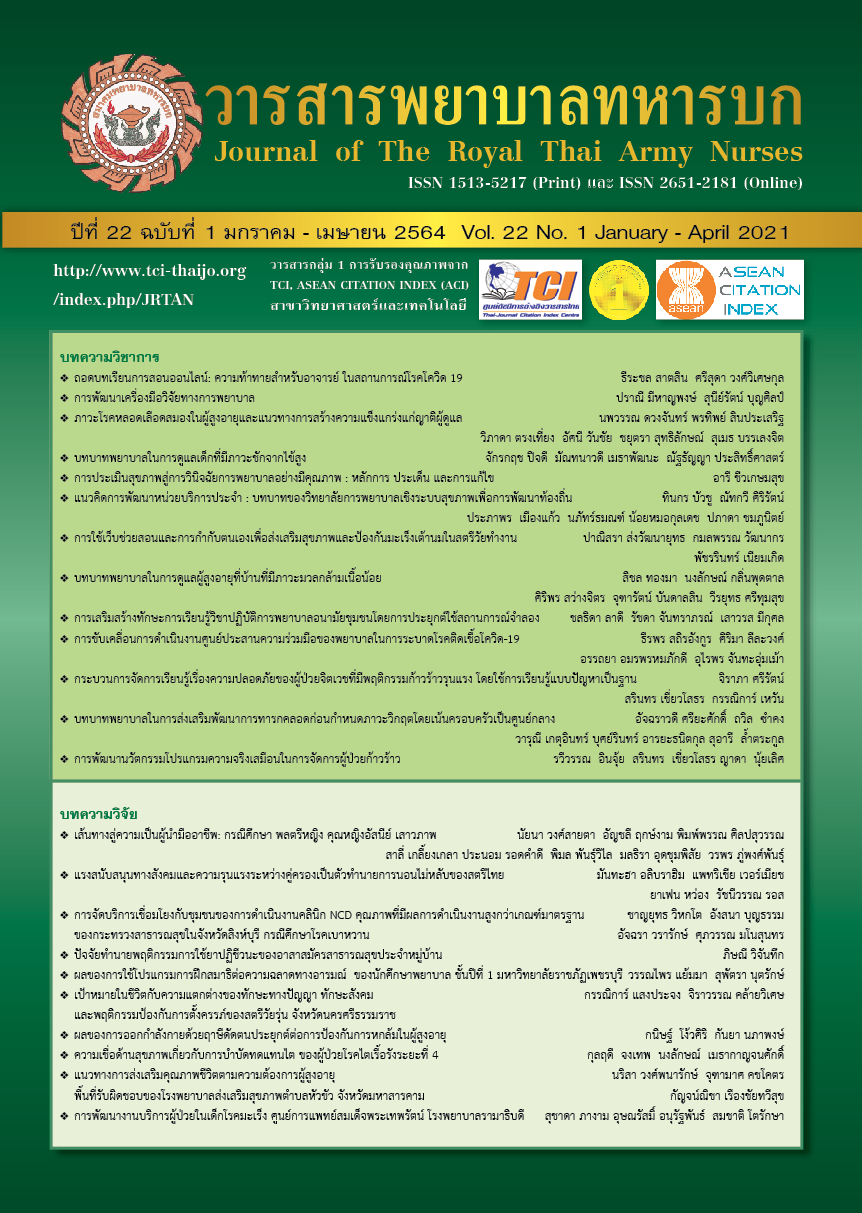Effect of Promoting Self Care Ability Program on Knowledge and Self-Care Behavior of Chronic Obstructive Pulmonary Disease Patients With Recurrent Acute Exacerbation
Keywords:
Chronic Obstructive Pulmonary Disease, Self-Care Behavior, Motivational Interviewing, Recurrent Acute ExacerbationAbstract
This study is one-group quasi-experimental research (pretest-posttest design). The purpose of this study was to examine the effects of promoting self-care ability program on knowledge and self-care behavior of chronic obstructive pulmonary disease (COPD) patients with recurrent acute exacerbation. Orem’s Self-Care Theory was used as the theoretical framework, and Motivational Interviewing were applied to guide the study. Purposive sampling was used to recruit 30 research participants. The data were analyzed using descriptive statistics and non-parametric Wilcoxon-rank test. The results revealed after receiving the program, the mean of participants’ COPD knowledge scores significantly increased from 9.03 to 13.87% (p < .05 and their self-care behavior scores significantly improved from 61.70 to 94.60 (p < .05). Regarding inhaler using techniques, the participants demonstrated correct using techniques for Handihaler, Accuhaler, and Turbuhaler in every step and showed improvement in the use of Metered Dose Inhaler (MDI).
Nurses play a vital role in promoting the patients to perform appropriate self-care behaviors continuously and sustainably.
Downloads
References
Global Initiative for Chronic Obstructive Lung Disease. Global strategy for the diagnosis, management, and prevention of chronic obstructive pulmonary disease; 2019.
Bureau of Non Communicable Disease. Chronic obstructive pulmonary disease: Bangkok; 2018. (in Thai)
Casey G. COPD: obstructed lungs. Kai Tiaki Nursing New Zealand. 2016; 22: 20-4.
. Sairat P, Wattana C, Takviriyanun N. Effects of a self-management training program on functional performance, acute exacerbation and quality of life among patients chronic obstructive pulmonary disease. Nursing Journal. 2014; 41: 23-35. (in Thai)
Boonsoong P. Effectiveness of self-management educational program for chronic obstructive pulmonary disease patients at Rongkwang Hospital, Phrae Province.(thesis). Chiangmai: Chiangmai University. 2014. (in Thai)
Luadtahan K, Oba N, Tansuphaswasdikul S. Effects of supportive educative program on self-care behaviors and BODE index among patients with chronic obstructive pulmonary disease. Journal of Nursing and Health Sciences. 2016; 10: 47-60. (in Thai)
Chouythoa T. Effects of a self-management support program in patients chronic obstructive pulmonary disease on knowledge, selfmanagement behaviors, dyspnea, and lung function. (thesis). Chonburi: Burapha University. 2015. (in Thai)
Ospina MB, Mrklas K, Deuchar L, Rowe BH, Leigh R, Bhutani M, et al. A systemic review of the effectiveness of discharge care bundle for patients with COPD. Chronic Obstructive Pulmonary Disease. 2017; 72: 31-39.
Miller WR. Rollnick S. Motivational interviewing : Help people change. 3rd ed. New York. 2013.
Benzo R, Vickers K, Ernst D, Tucker S, McEvoy C, Lorig K. Development and feasibility of a COPD self-management intervention delivered with motivational interviewing strategies. Journal of Cardiopulmonary Rehabilitation and Prevention. 2013; 33: 113-23.
Rehman H, Karpman C, Douglas .V, Benzo RP. Effect of a motivation interviewing-bassed health coaching on quality of life in subjects with COPD. Respiratory Care, 2017; 62: 1043-48.
Orem D. Nursing concepts of practice. 6th ed.). St.Louis: Mosby. 2001.
Brooke P, Bullock R. Validation of a 6 item cognitive impairment test with a view to primary care usage. International Journal Geriatric Psychiatry, 1999;14: 936-40.
Pimrugsa N. Effects of self-care program on self-care behavior, dyspnea and pulmonary rehabilitation in patients with chronic obstructive pulmonary disease.(thesis). Khonkaen: Khonkaen University. 2007. (in Thai)
Thoracic Society of Thailand Under Royal Patonage. chronic obstructive pulmonary disease, 2017.
Wiwatcharagoses K, Lueweerawong K. Factors associated with hospitalization of chronic obstructive pulmonary disease patients with acute exacerbation in the emergency department, Rajavithi hospital. Journal of the Medical Association of Thailand. 2016; 99: 161-7.
Wiriyachot A, Wattanakitkrilert D, Charoenkitkarn V, Dejsomritrutai W. Influences of perceived medication necessity, medication concern, satisfaction with information received, and experience of exacerbation on adherence of inhale combined bronchodilator and corticosteroid therapy in patients with chronic obstructive pulmonary disease. Journal of The Royal Thai Army Nurses. 2016; 17: 187-96. (in Thai)
Srinual P, Kompayak J, Buachareun H. Effect of pulmonary rehabilitation program to prevent exacerbation in patient with chronic obstructive pulmonary disease in community. Journal of The Royal Thai Army Nurses. 2019; 20: 351-9. (in Thai)
Pipopsuthipaiboon S, Kengganpanich M, Kengganpanich T, Chuaychoo B. The effectiveness of a self-management program for pulmonary rehabilitation of patients with chronic obstructive pulmonary disease. Journal of Public Health. 2017; 47: 200-11. (in Thai)
Krainara P, Malathum P, Nathisuwan S, Kawamatawong T. Self-care for medication use in older patients with chronic obstructive pulmonary disease. Ramathibodi Nursing Journal. 2011; 17: 287-304. (in Thai)
Downloads
Published
How to Cite
Issue
Section
License
บทความหรือข้อคิดเห็นใดใดที่ปรากฏในวารสารพยาบาลทหารบกเป็นวรรณกรรมของผู้เขียน ซึ่งบรรณาธิการหรือสมาคมพยาบาลทหารบก ไม่จำเป็นต้องเห็นด้วย
บทความที่ได้รับการตีพิมพ์เป็นลิขสิทธิ์ของวารสารพยาบาลทหารบก
The ideas and opinions expressed in the Journal of The Royal Thai Army Nurses are those of the authors and not necessarily those
of the editor or Royal Thai Army Nurses Association.






